0-cove(GODREJ) 9/20/98 5:23 PM Page 1
ELECTRONICS
P/N. JB68-60999A Rev. 2.0
�
0-cove(GODREJ) 9/20/98 5:23 PM Page 2
Operator’s Guide
Samsung Facsimile
SF3000/SF3000T
Please read this guide before you use this equipment.
�
0-Contents(GODREJ) 9/20/98 5:24 PM Page 1
Thank You for Choosing Samsung!
Your SF3000/3000T facsimile machine represents the very latest in technology. It is a full-
featured, high-performance device, built to Samsungs strict quality standards- the highest in
the industry. Were proud to offer you a product that will provide convenience and
dependability for years to come.
Important Precautions and Safety Information
When using this fax machine, these basic safety precautions should always be followed to
reduce risk of fire, electric shock, and injury to persons:
1. Read and understand all instructions.
2. Use common sense whenever operating electrical appliances.
3. Follow all warnings and instructions marked on the product and in the literature
accompanying the product.
4. If an operating instruction appears to conflict with safety information, heed the safety
information. You may have misunderstood the operating instruction. If you cannot resolve
the conflict, contact your sales or service representative for assistance.
5. Unplug the fax machine from the AC wall socket and telephone jack before cleaning. Do not
use liquid or aerosol cleaners. Use only a damp cloth for cleaning.
6. Do not place the fax machine on an unstable cart, stand, or table. It may fall, causing serious
damage.
7. Your fax machine should never be placed on, near, or over a radiator, heater, air conditioner,
or ventilation duct.
8. Do not allow anything to rest on the power, telephone. Do not locate your fax machine where
the cords will be abused by persons walking on them.
9. Do not overload wall outlets and extension cords. This can diminish performance, and may
result in the risk of fire or electric shock.
10. Do not allow pets to chew on the AC power, telephone.
11. Never push objects of any kind into the fax machine through case or cabinet openings. They
may touch dangerous voltage points, creating a risk fire or shock. Never spill liquid of any
kind onto or into the fax machine.
12. To reduce the risk of electric shock, do not disassemble the fax machine. Take it to a
qualified service technician when repair work is required. Opening or removing covers may
expose you to dangerous voltages or other risks. Incorrect reassembly could cause electric
shock when the unit is subsequently used.
13. Unplug the machine from the telephone jack, and AC wall outlet, and refer servicing to
qualified service personnel under the following conditions:
¥ When any part of the power cord, plug, or connecting cable is damaged or frayed.
¥ If liquid has been spilled into the product.
¥ If the product has been exposed to rain or water.
¥ If the product does not operate properly after instructions have been followed.
¥ If the product has been dropped, or the cabinet appears damaged.
¥ If the product exhibits a sudden and distinct change in performance.
14. Adjust only those controls covered by the operating instructions. Improper adjustment of
other controls may result in damage, and may require extensive work by a qualified service
technician to restore the product to normal operation.
15. Avoid using this fax machine during a lightning storm. There may be a remote risk of
electric shock from lightning. If possible, unplug the AC power, telephone, for the duration
of the lightning storm.
16. Never dispose of batteries or battery packs in a fire. There is a serious risk of explosion
and/or the release of highly toxic chemicals.
17. SAVE THESE INSTRUCTIONS.
�
0-Contents(GODREJ) 9/20/98 5:24 PM Page 2
In Case of Interference
In normal operation, your SAMSUNG fax machine produces and uses radio-frequency energy.
In some cases, this can cause interference to other electronic equipment. Part 15 of the FCC
rules establishes guidelines limiting the amount of radio-frequency energy which may be
produced by electronic equipment. Tests have proven that your Samsung FAX machine meets
or exceeds these guidelines, and is classified a Class B Digital Device for operation in a
residential environment. When installed and operated according to instructions, your
SAMSUNG fax machine should not cause interference to the types of equipment expected to be
found in a normal residential environment.
Unauthorized changes or modifications could void the users authority to operate the
equipment.
In the event your SAMSUNG fax machine appears to cause interference to other electronic
equipment, it can often be easily remedied. First determine if the source of interference really
is your FAX machine. To do this, turn its power off and on while observing the equipment
experiencing the interference. If the interference disappears when you turn the FAX machine
off, the following steps can be very effective in correcting interference problems:
¥ Connect the FAX machine to an AC outlet which is on a different circuit breaker from the
equipment experiencing interference.
¥ Increase the distance between the FAX machine and the equipment experiencing
interference.
¥ Cable TV amplifiers and splitters are extremely prone to interference. Be certain that they
are as far as possible from the FAX machine and its AC power and telephone cords.
¥ Replace twin lead antenna wire with shielded coaxial cable, and use proper connectors
and adaptors.
¥ Turn or relocate the receiving antenna. In most cases this is easily done by simply moving a
radio. A TV antenna may need to be re-oriented or installed in another area of the building.
¥ Consult your dealer, a reputable radio/TV technician, or an Amateur Radio Operator for
help.
*To locate an Amateur Radio Operator in your area, contact The American Radio Relay League, 610 Main St., Newington, CT 06111.
Fax Branding
The Telephone Consumer Protection Act of 1991 makes it unlawful for any person to use a
computer or other electronic device to send any message via a telephone facsimile machine
unless such message clearly contains in a margin at the top or bottom of each transmitted page
or on the first page of the transmission the following information:
(1) the date and time of transmission
(2) identification of either business, business entity or individual sending the message; and
(3) telephone number of either the sending machine, business, business entity or individual.
See page 2.12 for instructions on how to enter this information into your Samsung FAX
machines memory.
�
0-Contents(GODREJ) 9/20/98 5:24 PM Page 3
The Telephone Company may make changes in its communications facilities, equipment
operations, or procedures where such action is reasonably required in the operation of its
business and is not inconsistent with the rules and regulations in FCC Part 68. If such changes
can be reasonably expected to render any customer terminal equipment incompatible with
telephone company communications facilities, or require modification or alteration of such
terminal equipment, or otherwise materially affect its use or performance, the customer shall be
given adequate notice in writing, to allow the customer an opportunity to maintain
uninterrupted service.
Telephone Company Information
FCC IDENTIFICATION NUMBER
The Ringer Equivalence Number and FCC Registration Number for this equipment may be
found on the label located on the bottom or rear of the machine. In some instances you may
need to provide these numbers to the telephone company.
RINGER EQUIVALENCE NUMBER
The Ringer Equivalence Number (REN) is a measure of the electrical load placed on the
telephone line, and is useful for determining whether you have overloaded the line.
Installing several types of equipment on the same telephone line may result in problems
making and receiving telephone calls, especially ringing when your line is called. The sum of
all Ringer Equivalence Numbers of the equipment on your telephone line should be less than
five in order to assure proper service from the telephone company. In some cases, a sum of five
may not be usable on your line. If any of your telephone equipment is not operating properly,
you should immediately remove it from your telephone line, as it may cause harm to the
telephone network.
WARNING:
FCC Regulations state that changes or modifications to this equipment not expressly approved
by the manufacturer could void the users authority to operate this equipment.
In the event that terminal equipment causes harm to the telephone network, the telephone
company should notify the customer that service may be stopped. However, where prior
notice is impractical, the company may temporarily cease service, providing that they:
a) Promptly notify the customer.
b) Give the customer an opportunity to correct the equipment problem.
c) Inform the customer of the right to bring a complaint to the Federal Communication
Commission pursuant to procedures set out in FCC Rules and Regulations Subpart E of Part 68.
�
0-Contents(GODREJ) 9/20/98 5:24 PM Page 4
You should also know that:
¥ Your Samsung FAX machine is not designed to be connected to a digital PBX system.
¥ Special features, such as Call Waiting, may interrupt FAX service, and we suggest that
these services not be installed on the FAX line.
¥ If you intend to use a computer modem or fax modem on the same phone line as your FAX
machine, you may experience transmission and reception problems with all the equipment.
It is recommended that no other equipment, except for a regular telephone, share the line
with your FAX machine.
¥ If your area experiences a high incidence of lightning or power surges, we recommend that
you install surge protectors for both the power and the telephone lines. Surge protectors can
be purchased from your dealer or telephone and electronic specialty stores.
¥ When programming emergency numbers and/or making test calls to emergency numbers,
use a non-emergency number to advise the emergency service dispatcher of your intentions.
The dispatcher will give you further instructions on how to actually test the emergency
number.
¥ This equipment may not be used on coin service or party lines.
¥ This telephone provides magnetic coupling to hearing aids.
¥ You may safely connect this equipment to the telephone network by means of a standard
modular jack, USOC RJ-11C.
�
0-Contents(GODREJ) 9/20/98 5:24 PM Page 5
Contents
Chapter 1: Your New Machine
List of Features . . . . . . . . . . . . . . . . . . . . . 1.1
Parts . . . . . . . . . . . . . . . . . . . . . . . . . . . . . . 1.2
Common Parts . . . . . . . . . . . . . . . . . . . . 1.2
Familiarizing Yourself with Your
New Machine . . . . . . . . . . . . . . . . . . . . . . 1.3
Chapter 2: Installation And Setup
Choosing a Location . . . . . . . . . . . . . . . . . 2.1
. . . . . . . . . . . . . . . . . . . . . . . 2.1
Connections
Connection Diagram . . . . . . . . . . . . . . . 2.1
Handset . . . . . . . . . . . . . . . . . . . . . . . . . . 2.2
Document Tray . . . . . . . . . . . . . . . . . . . . 2.2
Document Exit Tray . . . . . . . . . . . . . . . . 2.3
Telephone Line . . . . . . . . . . . . . . . . . . . . 2.3
Extension Phone (Optional) (SF3000 only)
. . . . . . . . . . . . . . . . . . . . . . . . . . . . . . . . . . 2.4
AC Power Cord . . . . . . . . . . . . . . . . . . . 2.4
Backup Battery (SF3000T only) . . . . . . . . . . 2.5
. . . . . . . . . . . . . . . . . . . . . 2.6
Loading Paper
Chapter 3: Automatic Dialing
One-Touch Dialing . . . . . . . . . . . . . . . . . . 3.1
Storing a Number for One-Touch
Dialing . . . . . . . . . . . . . . . . . . . . . . . . . . . 3.1
Dialing a One-Touch Number . . . . . . . . 3.2
Speed Dialing . . . . . . . . . . . . . . . . . . . . . . 3.3
Storing a Number for Speed Dialing . . 3.3
Dialing a Speed Number . . . . . . . . . . . . 3.5
Chapter 4: The Fax Machine
Sending a Fax . . . . . . . . . . . . . . . . . . . . . . 4.1
. . . . . . . . . . . . . 4.1
Acceptable Documents
Setting Document Resolution
and Contrast . . . . . . . . . . . . . . . . . . . . . . 4.2
. . . . . . . . . . . . . . . . 4.3
Loading Document
. . . . . . . . 4.4
Sending a Fax Automatically
Printing Your Name and Number
. . . . . . . . . . . . . . . . . . . . . . . . . 4.4
(System ID)
Automatic Redial . . . . . . . . . . . . . . . . . . 4.4
Sending a Fax After Talking . . . . . . . . . . 4.5
Receiving a Fax . . . . . . . . . . . . . . . . . . . . . 4.6
Reception Modes . . . . . . . . . . . . . . . . . . 4.6
. . . . . . . . . . . . . 4.7
Receiving in Fax Mode
. . . . . . . . . . . . . . . . . . . . . . . 1.3
Front View
Rear View . . . . . . . . . . . . . . . . . . . . . . . . 1.3
Control Panel . . . . . . . . . . . . . . . . . . . . . 1.4
Fax Theory . . . . . . . . . . . . . . . . . . . . . . . . 1.6
Installing Print Cartridge . . . . . . . . . . . . . 2.7
Making a Copy . . . . . . . . . . . . . . . . . . . . . 2.10
Setting System ID and Date . . . . . . . . . . . 2.12
System ID (Your Number and Name) . 2.12
Using the Keypad to Enter Letters . . . . 2.13
Keypad Character Assignments . . . . . . 2.14
. . . . . . . . . . . . . . . . . . . . 2.15
Date and Time
Recording AUTO Greeting Message
(SF3000T only) . . . . . . . . . . . . . . . . . . . . . . . . 2.17
Recording TAD Message (SF3000T only) . . . 2.19
Paper Type and Sizes . . . . . . . . . . . . . . . . 2.20
Group Dialing (for Multi-Address Transmission)
. . . . . . . . . . . . . . . . . . . . . . . . . . . . . . . . . . 3.6
Storing Speed Dial Numbers for
Group Dialing . . . . . . . . . . . . . . . . . . . . . 3.6
Using Group Dialing (Multi-Address
Transmission) . . . . . . . . . . . . . . . . . . . . . . . . 3.8
. . . . 4.7
Receiving Manually in TEL mode
Receiving in AUTO Mode (SF3000) . . . . . 4.8
Receiving in AUTO Mode (SF3000T) . . . . 4.8
Receiving in TAD mode (SF3000) . . . . . . . 4.10
Receiving in TAD mode (SF3000T) . . . . . . 4.11
Using an Extension Telephone
. . . . . . . . . . . . . . . . . . . . . . . . 4.12
(SF3000 only)
. . . . . . . . . . . . . . . 4.12
Canceling Reception
Voice Request . . . . . . . . . . . . . . . . . . . . . . 4.13
Sending a Voice Request . . . . . . . . . . . . 4.13
Answering a Voice Request . . . . . . . . . . 4.13
Contents 1
�
0-Contents(GODREJ) 9/20/98 5:24 PM Page 6
Chapter 5: The Answering Machine
Checking Your TAD Greeting Message . 5.1
Monitoring an Incoming Call . . . . . . . . . 5.1
Playing Back Messages . . . . . . . . . . . . . . 5.2
Playing Back Caller Messages
Newly Received . . . . . . . . . . . . . . . . . . . 5.2
Playing Back All Messages . . . . . . . . . . 5.2
Skipping Backward or Forward . . . . . . 5.3
Erasing Old Messages . . . . . . . . . . . . . . . 5.3
Erasing All Recorded Messages . . . . . . 5.3
Chapter 6: Advanced Operations
Delayed Transmission . . . . . . . . . . . . . . . 6.1
To Cancel the Delayed Transmission
You have Set . . . . . . . . . . . . . . . . . . . . . . 6.4
Memory Transmission (Broadcasting) . . 6.5
Chapter 7: Special Features
Erasing a Selected Messages . . . . . . . . . 5.3
Call Transfer . . . . . . . . . . . . . . . . . . . . . . . 5.4
Turning On or Off the Call
Transfer Feature . . . . . . . . . . . . . . . . . . . 5.4
Using the Answering Machine from
a Remote Phone . . . . . . . . . . . . . . . . . . . . 5.6
Accessing the Machine . . . . . . . . . . . . . . 5.6
Using Remote Commands . . . . . . . . . . . 5.7
Polling . . . . . . . . . . . . . . . . . . . . . . . . . . . . 6.8
Being Polled By a Remote Machine . . . 6.8
Polling a Remote Machine . . . . . . . . . . . 6.9
. . . . . . . . . . . . . . . . . . . 7.1
REDIAL/PAUSE
To Redial the Number Last Called . . . . 7.1
. . . . . . . . . . . . . . . . . . 7.1
To Insert a Pause
Help List . . . . . . . . . . . . . . . . . . . . . . . . . . 7.2
Sending Tone Signal . . . . . . . . . . . . . . . . . 7.2
Using Flash . . . . . . . . . . . . . . . . . . . . . . . . 7.2
Chain Dialing . . . . . . . . . . . . . . . . . . . . . . 7.3
User Reports . . . . . . . . . . . . . . . . . . . . . . . 7.4
To Print a List . . . . . . . . . . . . . . . . . . . . . 7.5
User Options . . . . . . . . . . . . . . . . . . . . . . . 7.6
Setting an Option . . . . . . . . . . . . . . . . . . 7.6
FAX Options . . . . . . . . . . . . . . . . . . . . . . 7.7
TAD Options (SF3000T only) . . . . . . . . . . . . 7.10
Clearing Memory . . . . . . . . . . . . . . . . . . . 7.11
LCD Error Messages . . . . . . . . . . . . . . . . 8.11
Fixing Problems . . . . . . . . . . . . . . . . . . . . 8.13
. . . . . . . . . . . . . . . . . . . . . 8.13
Fax problems
Print Quality Problems . . . . . . . . . . . . . 8.15
Paper Feeding Problems . . . . . . . . . . . . 8.16
Clearing Jams . . . . . . . . . . . . . . . . . . . . . . 8.17
Document Jams During Transmission . 8.17
Paper Jams During Printing . . . . . . . . . 8.18
Chapter 8: Care And Maintenance
Cleaning the Document Scanner . . . . . . . 8.1
Print Cartridge Maintenance . . . . . . . . . . 8.3
Replacing the Print Cartridge . . . . . . . . . 8.3
Run Self Test . . . . . . . . . . . . . . . . . . . . . . . 8.6
Run Nozzle Test . . . . . . . . . . . . . . . . . . . . 8.7
Check Ink Level . . . . . . . . . . . . . . . . . . . . 8.8
. . . . . . . . . . . . . . 8.9
Cleaning the Cartridge
Wiping the Print Nozzles and Contacts 8.9
Cleaning the cartridge Carrier Contacts
and Deflector . . . . . . . . . . . . . . . . . . . . . 8.10
Appendix
Specifications . . . . . . . . . . . . . . . . . . . . . . A.1
2 Contents
�
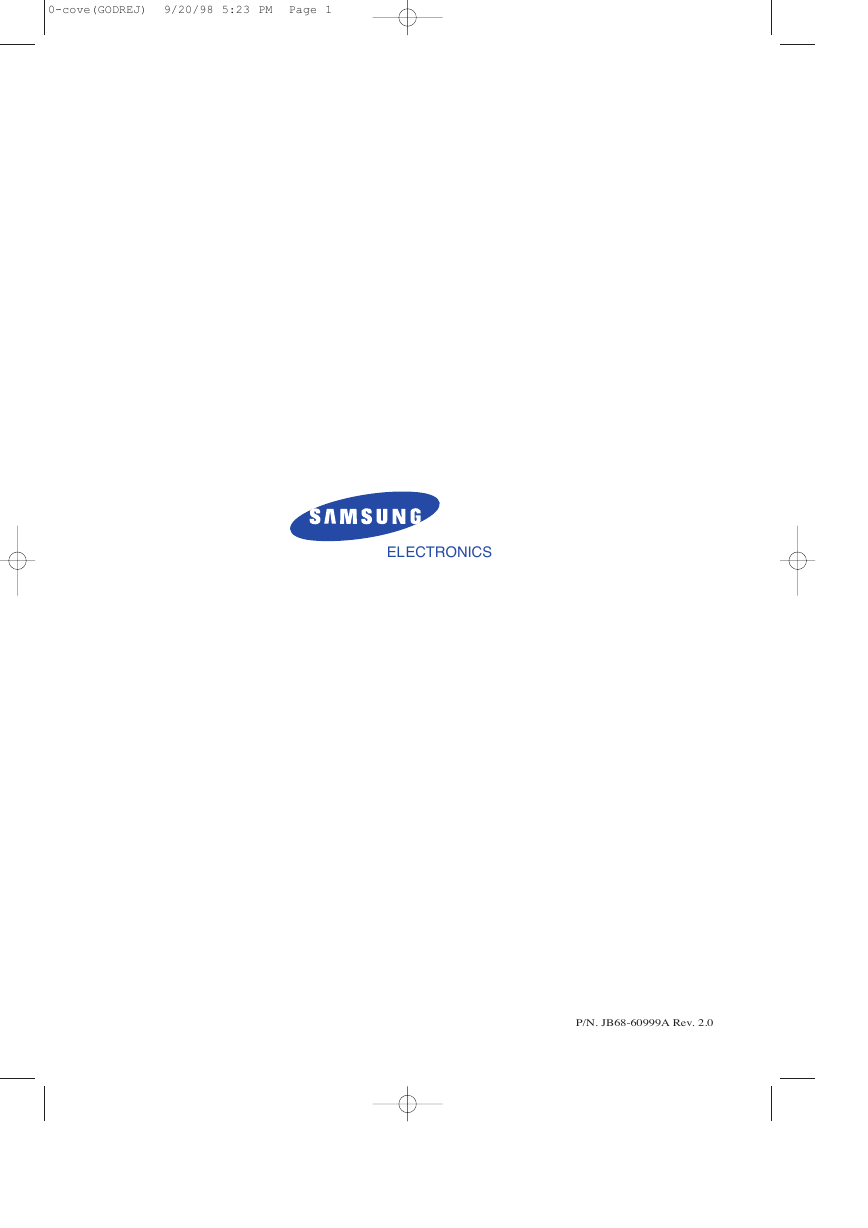
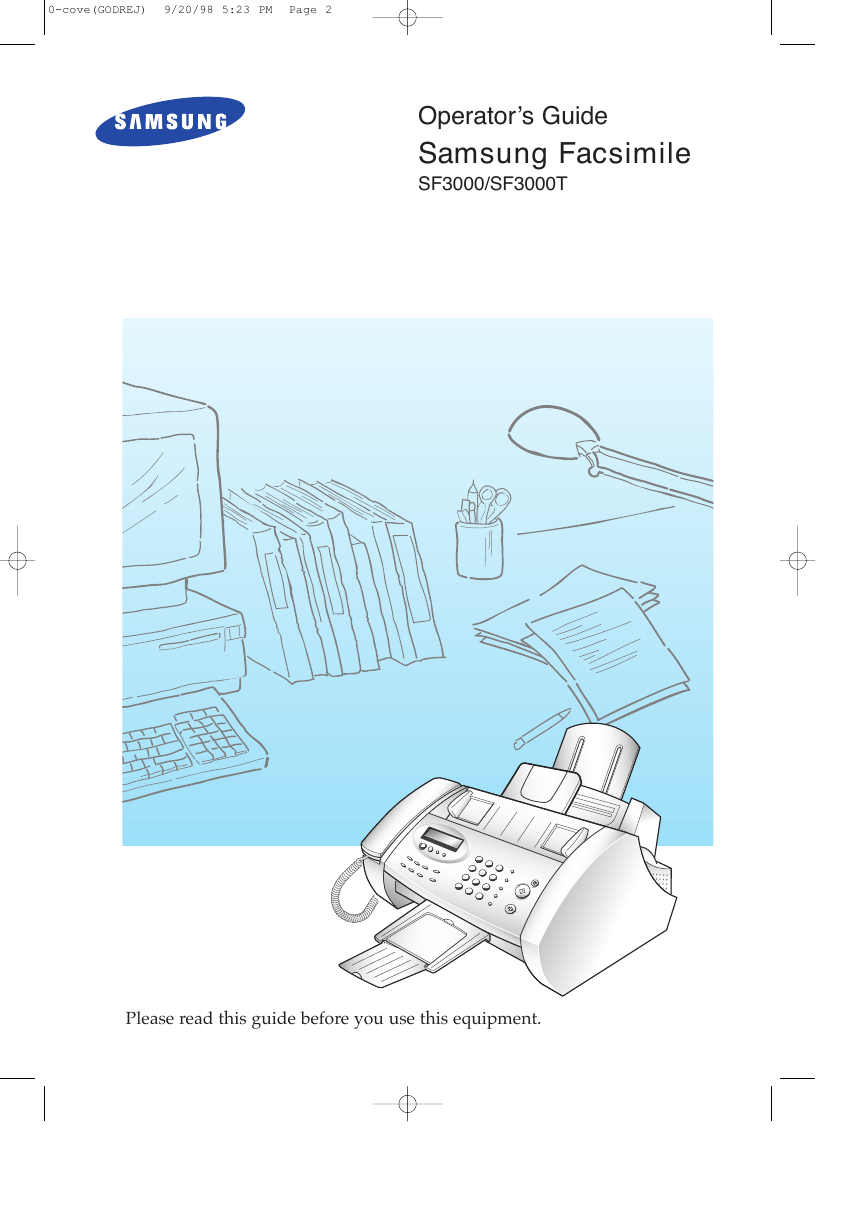
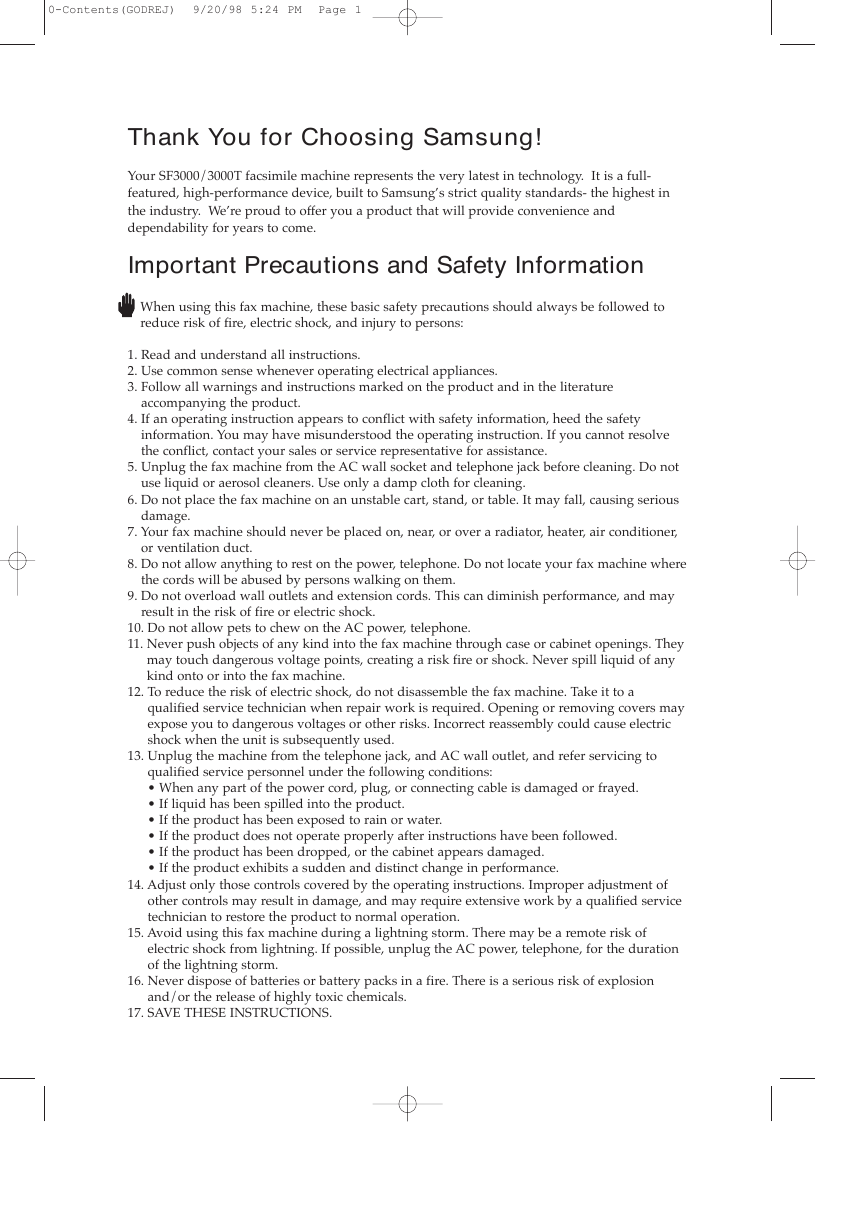
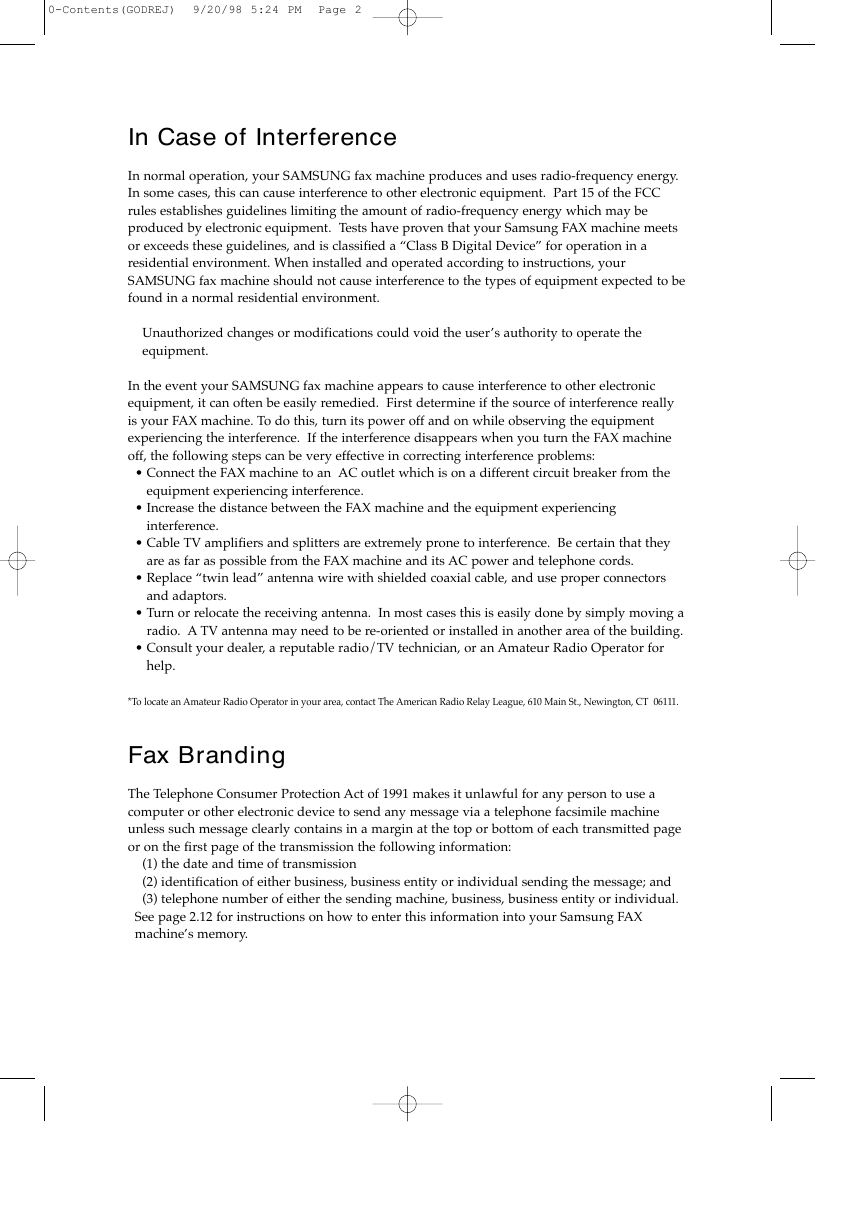
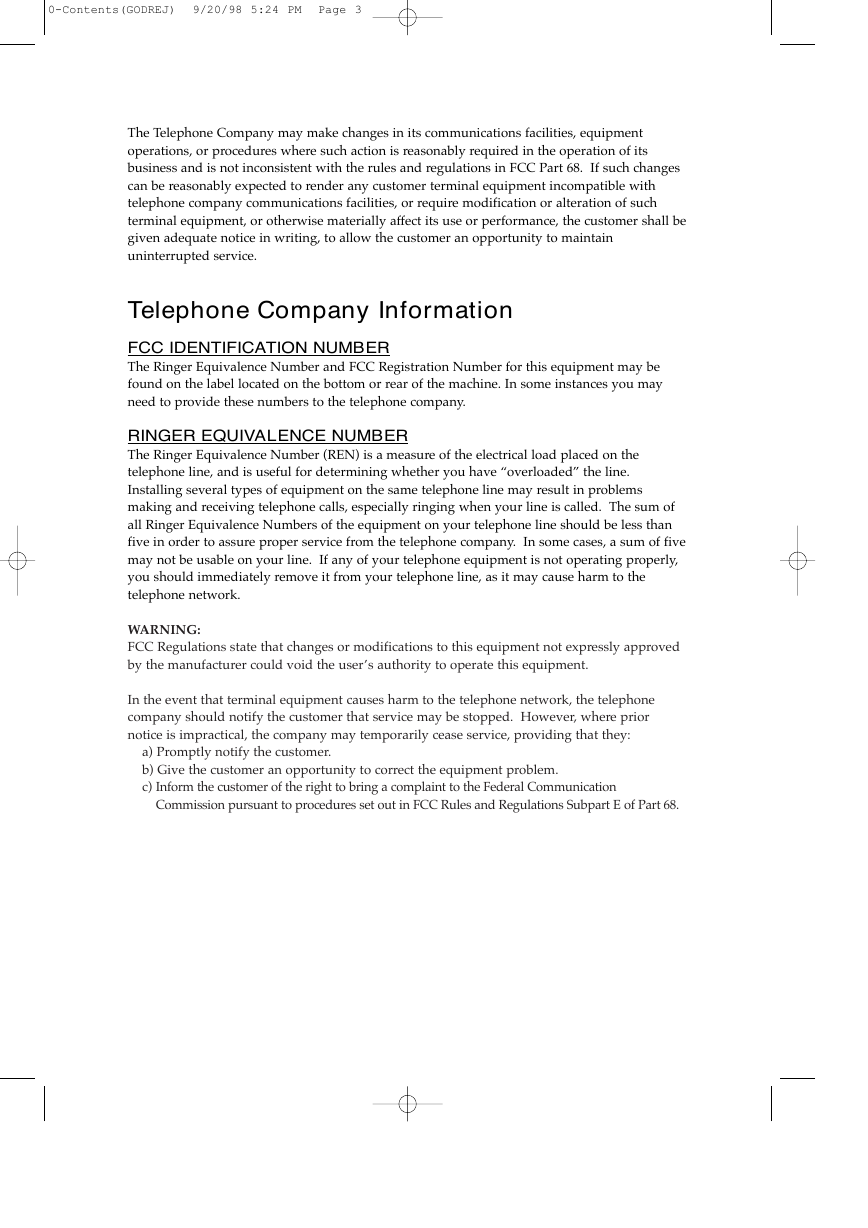
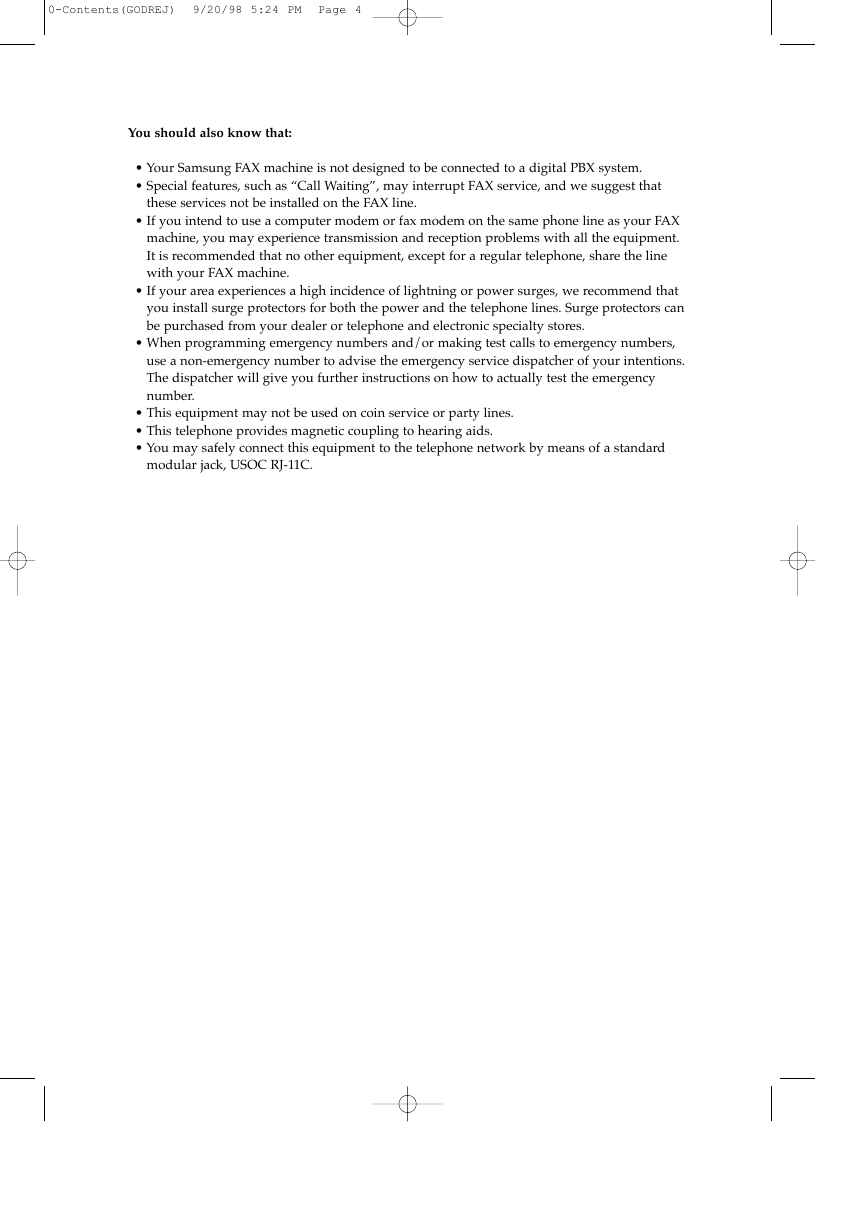
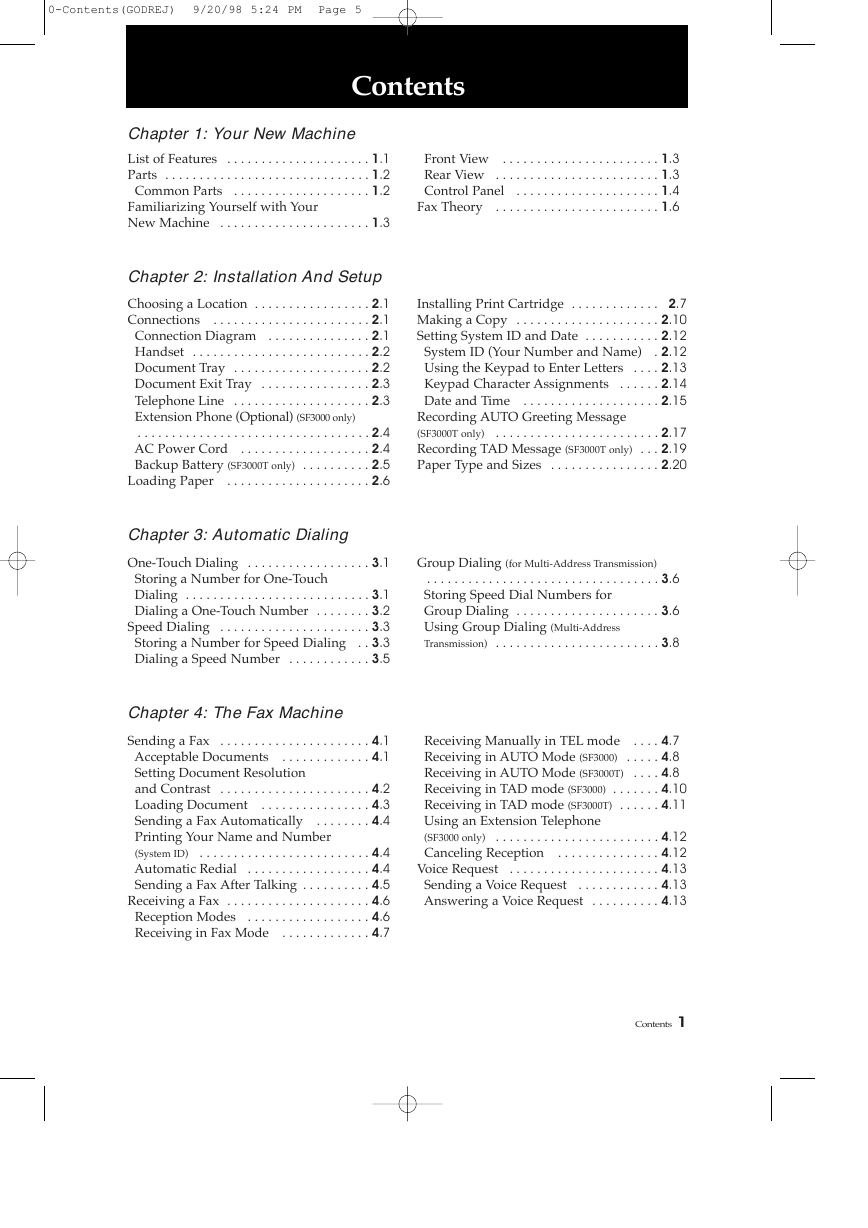
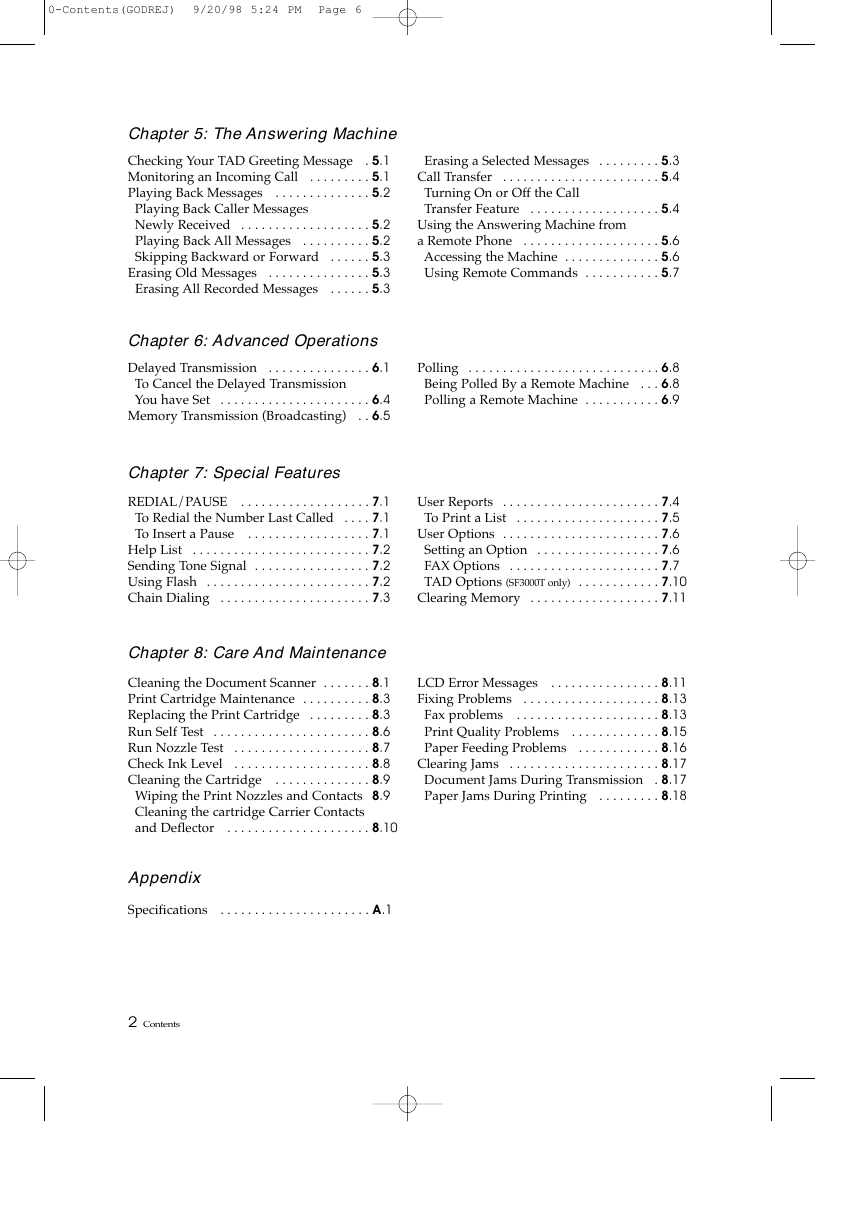








 2023年江西萍乡中考道德与法治真题及答案.doc
2023年江西萍乡中考道德与法治真题及答案.doc 2012年重庆南川中考生物真题及答案.doc
2012年重庆南川中考生物真题及答案.doc 2013年江西师范大学地理学综合及文艺理论基础考研真题.doc
2013年江西师范大学地理学综合及文艺理论基础考研真题.doc 2020年四川甘孜小升初语文真题及答案I卷.doc
2020年四川甘孜小升初语文真题及答案I卷.doc 2020年注册岩土工程师专业基础考试真题及答案.doc
2020年注册岩土工程师专业基础考试真题及答案.doc 2023-2024学年福建省厦门市九年级上学期数学月考试题及答案.doc
2023-2024学年福建省厦门市九年级上学期数学月考试题及答案.doc 2021-2022学年辽宁省沈阳市大东区九年级上学期语文期末试题及答案.doc
2021-2022学年辽宁省沈阳市大东区九年级上学期语文期末试题及答案.doc 2022-2023学年北京东城区初三第一学期物理期末试卷及答案.doc
2022-2023学年北京东城区初三第一学期物理期末试卷及答案.doc 2018上半年江西教师资格初中地理学科知识与教学能力真题及答案.doc
2018上半年江西教师资格初中地理学科知识与教学能力真题及答案.doc 2012年河北国家公务员申论考试真题及答案-省级.doc
2012年河北国家公务员申论考试真题及答案-省级.doc 2020-2021学年江苏省扬州市江都区邵樊片九年级上学期数学第一次质量检测试题及答案.doc
2020-2021学年江苏省扬州市江都区邵樊片九年级上学期数学第一次质量检测试题及答案.doc 2022下半年黑龙江教师资格证中学综合素质真题及答案.doc
2022下半年黑龙江教师资格证中学综合素质真题及答案.doc